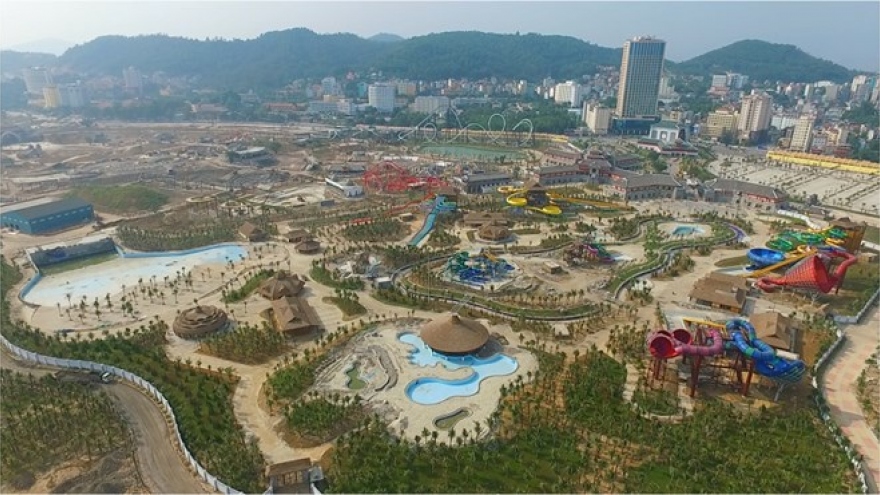Property market stays strong
Strong economic growth since 2015 has created a thriving domestic property market that is likely to continue next year, said Construction Minister Pham Hong Ha.
 |
The Minister told the first annual Vietnam Real Estate Forum in Hanoi this week that the market’s growth had made significant contributions to the country’s socio-economic development.
“Upbeat signs have been seen in the market index. Property inventories have fallen sharply due to growing housing demand, while the flow of direct and indirect foreign investment into the sector has soared,” he said.
The property market’s recovery has also bolstered the financial-securities market and other related industrial sectors, such as construction and building materials, the Minister said, predicting that resort properties would also continue to develop.
However, he said the market had displayed a lack of transparency. Further, parts of the real estate market had been manipulated by those with vested interests.
Most investment in property projects had come from credit institutions, banks and by mobilising home buyers.
“The structure of property products has not been suitable or closely managed. The supply of high-end estate segments has been higher than demand, while there has been a lack of commercial and social housing projects,” the minister added.
In addition, he said, State management agencies had not developed policies to respond to changes in the market. Also, he claimed the Government had not had adequate policies regarding taxes, credits and land, to regulate resources for market development, and had not encouraged social housing projects.
Nguyen Tran Nam, chairman of the Vietnam Real Estate Association (VNREA), agreed, saying that the estate market would be more stable next year.
Statistics indicate that Hanoi has some 20,000 apartments for sale. In total, the capital and HCM City have 45,000 to 50,000 apartments that are offered for sale in the market, while consumption results in only 30,000 sales per year.
“Therefore, the market has enough apartments to meet current demand,” Nam said, adding that there is no speculation in the market.
Nguyen Trong Ninh, director of the ministry’s Department of Housing Management and Real Estate Market, said the property market continued to see stable growth, including in resort properties at Da Nang, Nha Trang – Khanh Hoa and Phu Quoc – Kien Giang, which were attracting investments from local and foreign investors.
Credit in estate under control
Outstanding loans in the property sector are in line with the Government’s orientation and the market’s real demand. By the end of July, outstanding loans in the sector rose 4% from last year. Property loans account for 9% of the country’s total outstanding loans.
“The portion has been stable since 2013. The loans in the estate sector have focused on apartment projects, which are suitable for people’s demand,” said Nguyen Quoc Hung, director of the Credit Department under the State Bank of Vietnam (SBV).
In addition, the central bank has asked credit institutions to actively resolve bad debts, especially in the property sector. The bad debt rate in the sector was sharply reduced from 7.05% in 2013 to 4.06% in 2017.
Hung said the SBV would continue to stabilise the monetary market, while closely supervising credit in the estate sector to ensure effective and sustainable credit growth.
He proposed to continue renewing and improving planning, while shortening the time for approving social and commercial housing projects. Meanwhile, policies for these new types of properties, such as condotels and officetels, should be completed.
He said the Government was also on guard against speculation-driven growth in the market. Further, banks will not issue loans worth more than 70% of a project to property developers, and investors must use the loans to invest only in the project for which they received the loan.
Economist Le Xuan Nghia said he believed that financing for social housing projects has been challenging, as it mainly comes from bank loans instead of non-profit or Governmental resources.
“Bank loans should not be a long-term solution, as they cause pressure on the banking sector. I think the Ministry of Construction should study experiences from other countries in mobilising resources. This could include the establishment of a fund for social and inexpensive housing projects,” he added.
VNREA’s vice chairman Nguyen Manh Ha said social housing projects have been mostly located in big cities, such as Hanoi and Ho Chi Minh City.
The projects should be set in locations that are not too far from the city centres, and receive support through tax breaks.
Ha said establishing the fund could be difficult, as low and middle-income residents would likely be unable to contribute to the fund. Deep-pocketed donors would need to step up.
“The issue is that each locality should have their own solution to resolve the problem,” he said.
The forum, organised by VNREA in co-operation with the financial-economic channel VITV, is a large event that will assess the real estate market in a comprehensive manner, from commodities and segments to housing-related issues, such as land, finance, credit and tax.


